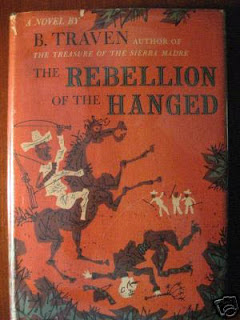
Today Rita’s class began a study of Traven’s Rebellión de los Colgados (Rebellion of the Hanged). The second half of the class featured a guest speaker, anthropologist Gaspar Morquecho. Professor Morquecho’s insightful presentation concerned the history of models of labour contracts involving Indigenous peoples of Chiapas, from the period of the Porfiriato (government of Porfirio Díaz, 1876-1911) to the present, as part of the process of Modernity in Mexico. The Porfiriato, is the period during which Traven’s novel is set.
Professor Morquecho began by explaining the system of enganchados, known in English as debt peonage, during the Porfiriato, as a means of explaining the logic of capitalism. He noted that the enganchados system was used to recruit the labour force for coffee plantations and mahogany harvesting, subjecting labourers to cruel punishments as a means of increase productivity. Traven's novel deals specifically with the mahogany fincas (monterías) in the Lacandon area and the virtual enslavement of Indigenous labourers. Professor Morquecho linked the detailed description of the labour in the monterías with transnational capital and the international context of the production of the novel (1950), the Second World War.
Professor Morquecho continued with a discussion of the Cárdenas administration (1934-1940), during which capitalism in Mexico underwent the process of substitution of imports. He explained that under Cárdenas, reformism appears with attempts to control the abuses of the finqueros through the Dirección de Protección de los indios and the Sindicato de trabajadores indígenas. But landowners in hard negotiations with the government made these Indigenous protective institutions another instance of intermediaries (or new-enganchadores).
Finally, Professor Morquecho considered the present, under the paradigm known as globalization, with Mexican labour strongly affected by the wars in Central America. Since the 1980s masses of illegal workers from Guatemala mainly enter Mexico and become 'enganchados' by mestizo landowners or big corporations, paid lower wages than what would paid to a Mexican campesino. This situation gives rise to conflict among Indigenous populations from Mexico and Guatemala. Professor Morquecho also noted a phenomenon of abandonment of their small agricultural lands in search for work, whether in the construction industry, in tourist places like Cancún, or in migration to urban centers (D.F.) or abroad (U.S.), becoming enganchados of another sort.
The somber panorama drawn by Morquecho points to the continuity of a system of labour exploitation that while transforming itself and acquiring other forms, still remains profoundly based on the exploitation of the Indigenous populations. When asked if the Zapatista movement has been able to correct such situation, Morquecho underlines its novelty—that in the midst of neoliberal policies being implemented so harshly in Mexico, a group of leftists managed to break away and declare a struggle based on the historical claims of the rights of people to their lands.
When asked if there is an indigenist new literature written in one of the Indigenous languages, Professor Morquecho gave the example of Jacinto Arias, Tzotzil, from the area of Chenalhó
No comments:
Post a Comment